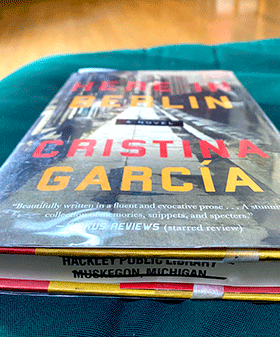You are your own library!
OMG it is 4:20 p.m. on 4/20. Also I have four minutes and twenty seconds until my next exercise drill.
Coincidence or convergence?
Everyone is going to be writing about marijuana and weed, but not I
Reading
I’m reading two books.
They’re similar, strange, and at a remove from present day life. And yet — with echoes.
What’s the French word for ‘bear’?
I started to read “In the Eye of the Wild” by French anthropologist Nastassja Martin. At least, I think she’s French. The book is translated from the French. I’ll find out eventually if she is from Paris, or from Burkina Faso.
The book opens in Kamchatka, and my Cyrillic alphabet let alone Russian is non existent, so this does present a challenge. Especially when a village is known only as “56.31948° N, 160.83748° E Klyuchi”, aka “Key Village” because it is a key defense establishment with a real runway, military planes, etc. Or maybe this is just a Russian village naming idiom. Quien sabe?
Now you may have noticed the geographic coordinates in that last sentence. Copy and paste, straight from the map! There are only three or four airfields in Kamchatka (Internet, prove me wrong!), even though there are many villages named “Klyuchi” throughout Russia. This one, on the southern shore of the Kamchatka river nestled between two giant volcanoes, was easy to find. It’s the only place for miles, kilometers, or within days of dogsledding around. So, I was able to find the village, zoom in on Apple Maps, copy coordinates, paste them into Google Earth, and even find a link there to a webcam. You too can view the stark snow covered volcanoes out amongst the clouds. From a distance.
Hard-working Nastassja, bitten on the head by a bear – in the face actually, this is a bear thing – , was flown from Klyuchi to Petropavlovsk — population 181,216, the “big city” of Kamchatka peninsula — where she could be strapped down, fed through a tube, and interrogated by today’s KGB, the FSB, as to exactly what she was doing so close to a “secret defense establishment” (Anthropology, duh). Also, to get preliminary reconstructive surgery under way on her jaw, head, and neck.
Nastassja feels an animistic kinship with the bear (maybe not), but her perception that Key Village is a secret missile base ready to fire across the Bering Strait seems off the mark. It is just across the tail end of the thousand-mile-long Aleutian Island chain, which seems of little strategic or, for that matter, tactical value. Moscow is 6600 miles to the west, so … what air defense could there be? Still, 15 or so MIG fighter planes can been seen parked in Petropavlosk, with another set of MIG parking runways either under construction, or in renovation. Not all of the Kamchatka’s 300,000 residents are native population or tourist guides to the wilderness. The main port on the other side of the Sea of Okhotsk, Magadan, population 92000, just has a couple of loading docks and, of course, a petroleum facility across the bay.
Anyway, this one seems to be about animism, the idea that humans can identify and telepathically communicate with animals. If so, though, why did the bear chew up N. Martin’s head? This we may never know, aside from the obvious and non-revelatory “that’s what wild bears do”.
–30–
‘Ici à Berlin’

While Nastassja was recovering, book number two had arrived from Muskegon: ‘Here In Berlin’ by Cristina Garcia. The book, a novel, is not translated from French. By the way, before you get too worried, I checked the Muskegon library catalog & they still have plenty of copies available to borrow.
Since the action takes place in Berlin – and partially in Cuba when one of the characters is kidnapped by the crew of a German U-Boat & who accompanies them up and down the Atlantic seacoast sinking merchant vessels – there are various German and Spanish colloquial phrases used by the characters: “me duela una mujer Carajo”
Here are some terms you can look up before you read.
-Liebe
-Vati
-Mutti
-schatzi
-Trummerfrauen
-nicht wahr
-ja genau
-'koertig' : courteous
-Gott sie dank
-Ja richtig, yeah right
-Un cubano que no hable mierda.
-Ich hab an dich gedacht Als der Tango Notturno Zwischen abend und morgen Aus der Ferne erklang
-I thought of you As the Tango Notturno Between evening and tomorrow Sounded from a distance
-Püppchen, --- Moppet
-"Schönes Wochenende." "Nice weekend‘Here in Berlin’ was inventive, enjoyable to read and, as with ‘Eye of the Wild’, good to read with map app in hand, to see where various rivers, highways, and districts are located. Eminently re-readable
An odd thing I did not understand … In Gunter Grass’s novel The Tin Drum, the main character is a self-made dwarf Oskar Matzerath, who at age three ‘decides to stop growing’. Oskar also appears in a chapter or two of ‘Here in Berlin’ along with a much shorter dwarf.
Anyway, you can read the incredibly complicated plot of The Tin Drum (the movie) which won a bunch of awards and was a financial success in (at the time) West Germany.
--30--— all photos Copyright © 2022-2024 George D Girton all rights reserved